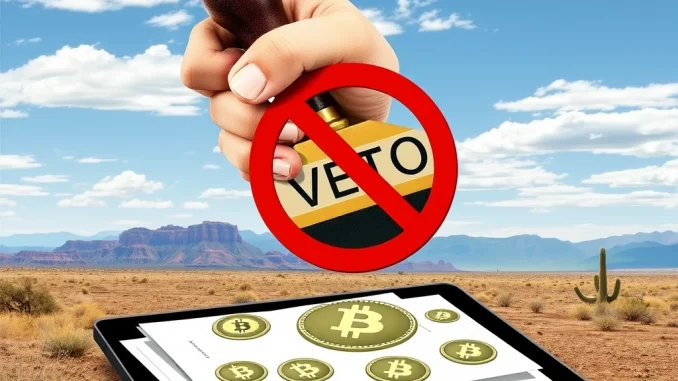
Recent legislative efforts in Arizona aimed at integrating digital assets into state operations have hit a roadblock. Arizona Governor Katie Hobbs recently vetoed two significant pieces of legislation concerning cryptocurrency and blockchain technology, impacting the potential for expanded use of Arizona digital assets within state functions.
Governor Katie Hobbs Blocks Key Arizona Crypto Bills
On May 12, Arizona Governor Katie Hobbs exercised her veto power on two bills that sought to increase the state’s engagement with digital assets. This action follows an earlier veto concerning crypto investments, signaling a cautious approach from the governor’s office regarding the state’s direct involvement with cryptocurrencies.
What Did the Vetoed Bills Propose?
The two bills, SB 1373 and SB 1024, represented different avenues for integrating digital assets into state infrastructure and finance. Understanding their specific proposals helps clarify the scope of the governor’s decision:
- SB 1373: The Digital Assets Strategic Reserve Fund
This bill proposed establishing a dedicated fund intended to hold digital assets acquired by the state. These assets could potentially come from sources such as legislative appropriations or, notably, from seizures related to legal proceedings. The concept was to create a formal state-managed repository for cryptocurrency and other digital assets. - SB 1024: Enabling State Crypto Payments
This legislation aimed to allow state agencies to accept payments in cryptocurrency. Under the bill’s provisions, citizens and businesses could potentially use digital currencies to settle various obligations, including fines, taxes, and fees. The bill stipulated that these payments would need to be processed via approved third-party providers, adding a layer of infrastructure for handling state crypto payments.
These vetoes build upon a previous decision by Governor Hobbs earlier in the legislative session. She had also vetoed SB 1025, a bill that would have permitted the state treasury and retirement funds to invest a portion (up to 10%) of their assets in Bitcoin (BTC) and other digital assets. This earlier veto, combined with the latest decisions, paints a clear picture of the governor’s current stance on the state’s direct financial exposure and operational integration of cryptocurrencies.
The Significance of the Katie Hobbs Veto
The decision by Governor Katie Hobbs vetoing these bills is a significant development for the crypto and blockchain community in Arizona. Proponents of the bills argued they would modernize state financial operations, potentially create new revenue streams (via the reserve fund), and offer citizens more payment flexibility. The vetoes, however, indicate that the governor’s administration likely has concerns regarding the volatility of digital assets, the regulatory landscape, or the technical and security challenges associated with managing state crypto holdings and transactions.
While the vetoes halt these specific initiatives for now, they don’t necessarily signal an end to discussions about digital assets in Arizona state government. They do, however, underscore the cautious approach some state leaders are taking when it comes to integrating volatile and rapidly evolving technologies like cryptocurrency into core government functions and financial reserves, including the proposed crypto reserve fund and systems for accepting state crypto payments.
Conclusion: What’s Next for Arizona Digital Assets?
The vetoes of these key Arizona crypto bills mean that for the immediate future, the state will not be establishing a digital assets reserve fund, nor will state agencies be accepting cryptocurrency for payments like taxes and fees. Furthermore, state treasury and retirement funds remain restricted from direct investment in digital assets. This sets Arizona apart from some other states that are exploring or implementing similar initiatives. The path forward for greater integration of Arizona digital assets into state operations will likely require addressing the concerns that led to these vetoes, potentially involving different legislative approaches or a more developed federal and state regulatory framework for digital assets.



